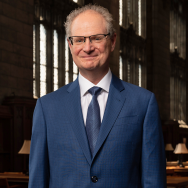The Norwegian Academy of Science and Letters announced on June 12 that University of Chicago President Paul Alivisatos will share the 2024 Kavli Prize in Nanoscience.
The prestigious award went to Alivisatos, along with MIT’s Robert Langer and Northwestern University’s Chad Mirkin, for their pioneering research, which “revolutionized the field of nanomedicine by demonstrating how engineering nanoscale materials can advance biomedical research and application.”
In its award citation, the Academy wrote: “Their discoveries contributed foundationally to the development of therapeutics, vaccines, bioimaging and diagnostics.”
Every other year, the Kavli Prize honors scientists for breakthroughs in astrophysics, nanoscience and neuroscience that “transform our understanding of the big, the small and the complex.” Each prize includes a $1 million award split among the recipients, who will be honored at a ceremony in Norway in September.
“I am so happy to share the Kavli Prize in Nanoscience with Bob Langer and Chad Mirkin, and to have played a role in the discoveries being honored,” said Alivisatos, AB’81. “The tools we developed have helped advance medicine and biological discovery in many ways. I am grateful to my many coworkers over the years who did so much to bring these discoveries to light. I especially want to acknowledge my College experience at the University of Chicago, and the UC Berkeley and the Lawrence Berkeley National Lab communities that fostered me and this work.”
“President Alivisatos’ pioneering research helped transform the field of nanoscience and has had a tremendous impact on society,” said Ka Yee Lee, interim dean of the Physical Sciences Division and the David Lee Shillinglaw Distinguished Service Professor in the Department of Chemistry and the College. “The Kavli Prize is a fitting recognition of his fundamental work, and I join members of the UChicago community in congratulating him for this prestigious honor.”
“President Alivisatos’ pioneering research helped transform the field of nanoscience and has had a tremendous impact on society.”
Tiny particles with big potential
Alivisatos, the John D. MacArthur Distinguished Service Professor in the Department of Chemistry, the Pritzker School of Molecular Engineering and the College, is widely known as a pioneer in the field of nanoscience—the study of how materials behave at extremely tiny scales.
In the 1990s, Alivisatos and his research group at the University of California-Berkeley made a number of breakthroughs using particles so small that they are called quantum dots. His group showed how to make large amounts of quantum dots, and how to use them to take snapshots of very subtle biological processes that are hard to track using other methods.
In this approach, researchers make quantum dots that shine in a variety of different colors, and use them to “label” different kinds of cells—or even different parts within cells. Today this process is used around the world in research to better understand fundamental principles of medicine, biology, and disease, as well as diagnostic imaging for individual patients.
“It was not long after the early colloidal nanocrystal studies that it became clear that this would be an important area of science with many potential applications,” Alivisatos said. “This discovery arose from a spirit and practice of open team science, of deliberately engaging science to bring technology benefits to humanity.”
Among his awards and honors, Alivisatos has received the National Medal of Science, the Wolf Prize in Chemistry, the Priestley Medal and the international BBVA Frontiers of Knowledge Award. He is a member of the National Academy of Sciences, the American Academy of Arts and Sciences, and the American Philosophical Society. He is a founding editor of the journal Nano Letters. He also founded two nanotechnology companies: Nanosys, Inc. and Quantum Dot Corp. (now part of Thermo Fisher).
After receiving his bachelor’s degree from the University of Chicago in 1981, Alivisatos earned his Ph.D. in chemistry from the University of California, Berkeley in 1986. After a period at Bell Labs, Alivisatos joined the Berkeley faculty in 1988. He served as director of the Lawrence Berkeley National Laboratory from 2009 to 2016 and as executive vice chancellor and provost at Berkeley, before joining the University of Chicago to serve as its president in 2021.
"Paul is a central pioneer in the field of nanoscience. His groundbreaking research developing quantum dots for biological imaging and other applications exemplifies how discovery science can lead to solutions that improve our lives," said Mike Witherell, director of Lawrence Berkeley National Laboratory.
The Kavli Prize is a partnership among the Norwegian Academy of Science and Letters, the Norwegian Ministry of Education and Research, and the Kavli Foundation in the U.S.









